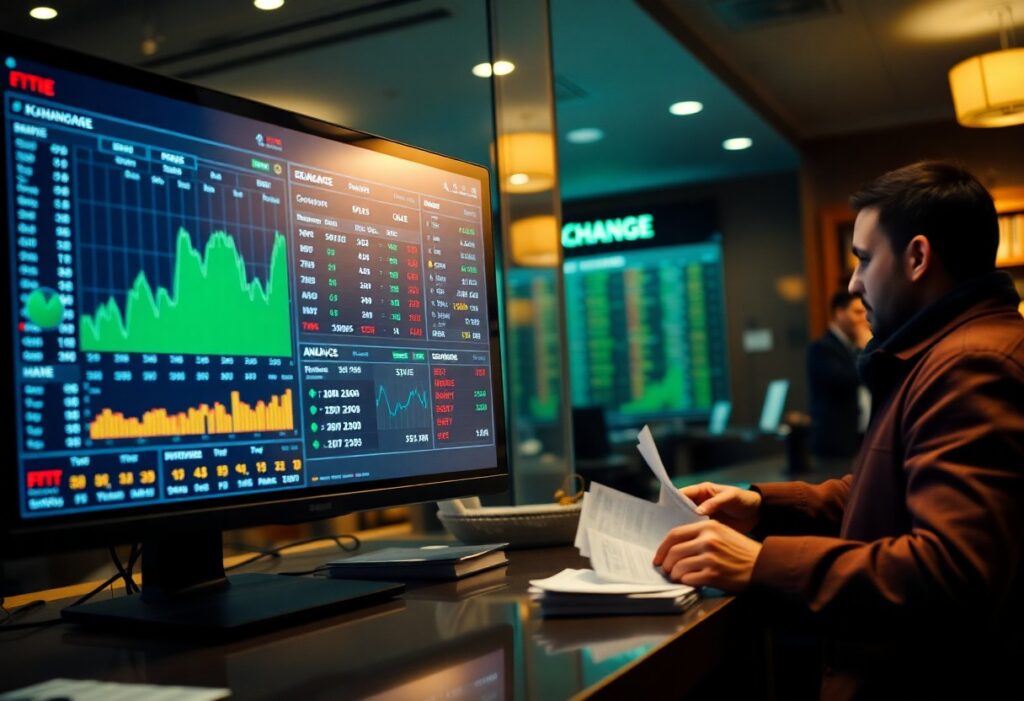
Many bettors find themselves torn between trading on betting exchanges and sticking with traditional bookmakers. Each option offers unique advantages and risks that can significantly impact your betting strategy and overall profitability. Understanding how to navigate these platforms will enhance your decision-making capabilities and help you maximize your returns. In this guide, you will discover the key differences, from odds manipulation to commission fees, empowering you to make informed choices about where to place your hard-earned money.
Key Takeaways:
- Betting exchanges allow users to act as both bettors and bookmakers, offering more flexibility in trading strategies compared to traditional bookmakers.
- Odds on betting exchanges are determined by market demand, which can lead to better value for bettors, while traditional bookmakers often set fixed odds that may not reflect the most current information.
- Trading on betting exchanges can involve features such as in-play betting and the ability to lay bets, providing advanced options for experienced bettors to manage risk and leverage opportunities.
The Core Mechanics of Betting Exchanges vs. Traditional Bookmakers
Understanding the mechanics of betting exchanges and traditional bookmakers reveals significant differences in how you can engage with betting markets. Traditional bookmakers set their own odds and take bets directly from customers, effectively acting as the house. In contrast, betting exchanges allow users to place bets against each other, with the exchange providing the platform and facilitating transactions. This fundamental distinction greatly influences the strategies you can implement and the overall betting experience.
How Bets Are Placed: The Role of the Market
In traditional bookmakers, you place bets directly against the odds offered, which are determined by the bookmaker’s calculations and risk management strategies. Conversely, betting exchanges operate on a market-driven model where you can either back (bet on something to happen) or lay (bet against something happening) based on the odds provided by other users. This means you can set your own odds in the market, allowing you to make more informed betting decisions.
Understanding Liquidity: A Key Difference
Liquidity in betting refers to the availability of funds to match bets within the market. Traditional bookmakers possess fixed liquidity based on their customers and overall betting activity. In contrast, betting exchanges thrive on user-generated liquidity, allowing for multiple bets to be placed and matched in real-time. This dynamic can lead to more favorable odds and greater opportunities for profit as you engage with a broader range of buyers and sellers.
In a betting exchange, liquidity is often determined by the number of participants actively placing bets and their willingness to accept different odds. The higher the liquidity, the better the chances of getting your bet matched, especially for larger stakes. For instance, during major sporting events, the influx of users can significantly increase the liquidity and lead to tighter spreads between back and lay odds. This can enhance your betting strategy, allowing you to optimize your entries and exits more effectively than relying on bookmakers’ static odds.
Pricing Dynamics: Odds and Market Forces
Understanding the mechanics behind pricing dynamics on betting exchanges versus traditional bookmakers reveals fundamental differences in how odds are determined. In betting exchanges, odds are influenced by the collective wisdom of all participants, creating a dynamic market environment. As new information surfaces or as bets are placed, odds fluctuate in real time based on market forces, providing you with opportunities to capitalize on inefficiencies—or to miss out if you’re not vigilant.
The Influence of Supply and Demand in Betting Exchanges
On betting exchanges, supply and demand dictate the odds you see. If a team is heavily backed by punters, the odds will decrease as demand increases, showing that many believe the outcome is highly likely. Conversely, if there’s a lack of interest, odds will widen, reflecting uncertainty in the outcome. You can capitalize on these fluctuations by placing bets at optimal moments in line with changing market sentiment.
Traditional Bookmakers: The House Edge Explained
Traditional bookmakers employ a house edge model, ensuring they maintain profitability regardless of the outcome of events. This is typically reflected in the odds offered, which are presented in a way that the bookmaker guarantees a margin of profit. This means that, unlike betting exchanges, you aren’t betting against other punters, but rather the bookmaker, who adjusts their odds to favor their bottom line.
The house edge varies widely among bookmakers and can range from 3% to 10% or more, depending on the sport and market. For example, sports with more unpredictable outcomes, like football, might offer tighter margins compared to a more predictable sport like basketball. This model means that even when you win, the odds you receive may be lower than the true probability of the event occurring, as the bookmaker accounts for potential payouts. This structured pricing can limit your ability to find value bets compared to the fluidity of betting exchanges, where you have the chance to influence the odds directly and potentially secure greater returns.
Strategies for Success: Tailoring Your Approach
Success in betting requires a tailored approach that fits your preferred platform. Each method—whether on an exchange or with traditional bookmakers—calls for unique strategies. Understanding the specific opportunities and pitfalls of the platform you choose is imperative. For instance, while exchanges may benefit from real-time trading tactics, traditional betting might require an emphasis on value betting and disciplined bankroll management. By aligning your strategies with the characteristics of each environment, you can optimize your potential for profits.
Leveraging In-Play Opportunities on Exchanges
In-play betting on exchanges allows you to analyze live events and react to changing dynamics, creating a fluid strategy. As game situations evolve, you can place or adjust bets based on real-time performance metrics. This adaptability is vital; for example, if a key player is injured or a team shows unexpected strength, capitalizing on these insights can lead to significant profits. It’s about being observant and acting quickly on market movements.
Utilizing Predictive Models for Traditional Bets
Predictive models serve as powerful tools for traditional betting, allowing you to harness data for smarter wagering decisions. By analyzing historical performance, weather conditions, and player statistics, you can create algorithms that forecast outcomes more accurately. For instance, using machine learning techniques can enhance your predictions by identifying patterns in player form and match conditions that are often overlooked by bookmakers. This methodological approach not only boosts your confidence in placing bets but can also improve your overall win rate significantly.
Risk Management: Navigating Volatility and Losses
Effective risk management is vital in the constantly shifting landscape of betting exchanges compared to traditional bookmakers. With the potential for quick financial gains also comes the possibility of significant losses. Strategies like setting stop-loss limits and regularly reviewing your betting strategies can help mitigate risk. Additionally, focusing on bankroll management ensures you never risk more than you can afford to lose, allowing you to weather the inevitable ups and downs inherent in trading.
The Safety Net of Betting Exchanges: Trading vs. Betting
Betting exchanges provide a level of flexibility not typically associated with traditional betting models. You can trade positions, enabling you to lock in profits or cut losses mid-event. This method of trading allows you to react to the changing dynamics of a game or match, providing a more responsive safety net than conventional betting. What this means for you is that with carefully crafted strategies, you can significantly reduce the impact of volatility on your bankroll.
Bookmaker Limitations: Understanding Exposure and Liability
Traditional bookmakers enforce strict limitations that can affect your betting experience and potential returns. Such limitations include maximum bet amounts and odds manipulation, which can lead to reduced payouts based on your profile. Moreover, bookmakers often evaluate your betting history for signs of strategic betting and may reduce your limits or even close your account entirely if they perceive excessive risk. Understanding these factors is vital for effective risk management in this arena.
The limitations imposed by bookmakers not only affect betting sizes but also influence your overall strategy. For instance, their exposure to liability can prompt them to alter odds substantially as the betting pool develops, creating scenarios where your potential winnings diminish due to their internal risk assessments. A bookmaker may decide to restrict certain markets or impose tighter odds to protect themselves against significant losses from informed bettors. This dynamic can severely affect your ability to consistently profit, showcasing the need for a savvy approach that acknowledges these constraints when placing bets.
The Community Effect: Insights from Peer Interactions
Engaging with a community of peers can significantly enhance your betting strategies and overall success. By sharing insights and experiences, you gain exposure to diverse perspectives that can inform your decision-making process. Collaborative environments encourage discussion around odds, market trends, and strategies, enabling you to refine your approach and leverage collective knowledge for better betting outcomes.
The Role of Social Betting: Collaboration on Exchanges
Social betting fosters a sense of collaboration that is often absent in traditional betting environments. On exchanges, you can connect with other traders to exchange tips or even pool resources for certain bets. This synergy increases the likelihood of informed decision-making and enhances the overall profit potential, ensuring that you are not just relying on your own intuition.
Information Asymmetry: The Insider Advantage on Bookmakers
Information asymmetry in traditional bookmakers can create an uneven playing field, wherein some bettors hold an insider advantage. This often results from access to crucial information that is not widely available, such as insider news related to team injuries, lineup changes, or market sentiments. High-stakes players who leverage such information can exploit the odds set by bookmakers, while casual bettors may find themselves at a disadvantage, betting on incomplete data.
In traditional bookmakers, information asymmetry is not just about knowing something others don’t; it can radically alter the betting landscape. For example, seasoned bettors might have established connections with insiders or analysts who provide data that isn’t released to the general public. Consequently, they can adjust their bets by capitalizing on shifts in odds before they become available to the broader community. This insight can mean the difference between a well-informed wager and one made on scarce or outdated information. Furthermore, bookmakers often adjust their lines based on the volume of bets placed, meaning that if the big players react quickly to insider info, the odds could shift unfavorably for the average bettor. Understanding this dynamic can help you navigate the complexity of betting markets more effectively.
Summing up
The choice between trading on betting exchanges and using traditional bookmakers ultimately depends on your betting style and goals. If you prefer greater flexibility, the ability to set your own odds, and a more dynamic trading environment, betting exchanges may be more suited to you. However, if you appreciate the simplicity and convenience of fixed odds, traditional bookmakers could be your better option. Weigh your preferences carefully to decide which platform aligns best with your betting strategy.
Q: What are the main differences between trading on betting exchanges and placing bets with traditional bookmakers?
A: The primary difference lies in the structure of the betting markets. In traditional bookmakers, the odds are set by the bookmaker, and bettors must accept those odds to place their wagers. Conversely, betting exchanges allow users to act as both bettors and bookmakers, meaning they can offer their own odds and accept or reject bets based on their preferences. This flexibility can lead to better pricing and opportunities for trading strategies. Additionally, betting exchanges generally provide a wider range of betting options, including the ability to back and lay bets, which can enhance the overall betting experience.
Q: How does liquidity impact trading on betting exchanges compared to traditional bookmakers?
A: Liquidity is a key factor in successful trading. Betting exchanges typically offer greater liquidity than traditional bookmakers because multiple users are actively placing bets, which creates a more dynamic marketplace. The availability of funds from multiple bettors means better odds can be found, and trades can be executed more quickly. However, liquidity can fluctuate based on the popularity of the event or market. In contrast, traditional bookmakers have fixed betting limits and can restrict the number of bets placed, which can limit trading opportunities. Thus, understanding liquidity is vital for effective trading on betting exchanges.
Q: Are there different risk levels associated with trading on betting exchanges versus traditional bookmakers?
A: Yes, there are different risk levels involved in trading on betting exchanges compared to traditional bookmakers. When using a betting exchange, users face market risk; their position can change based on the evolving odds and market sentiment. Since users can both back and lay bets, this flexibility can mitigate some risk but also introduce complexities in managing those positions. On the other hand, with traditional bookmakers, the risk is generally limited to the amount wagered, as users cannot hedge their bets in the same way. This difference necessitates a thorough understanding of trading strategies when using exchanges, as losses can accumulate more quickly due to market fluctuations.



